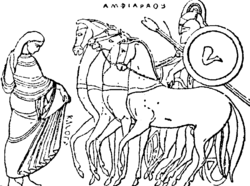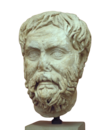Amphiaraus

AmphiarausorAmphiaraos(/ˌæmfiəˈreɪəs/;Ancient Greek:Ἀμφιάραος, Ἀμφιάρεως, "very sacred"[1]) was inGreek mythologythe son ofOicles,a seer, and one of the leaders of theSeven against Thebes.Amphiaraus at first refused to go withAdrastuson this expedition against Thebes as he foresaw the death of everyone who joined the expedition. His wife,Eriphyle,eventually compelled him to go.[2]
Family
[edit]Amphiaraus was the son ofOicles.[3]This made Amphiaraus a great-grandson ofMelampus,himself a legendary seer,[4]and a member of one of the most powerful dynastic families in theArgolid.[5]ThemythographerHyginus says that Amphiaraus's mother wasHypermnestra,the daughter ofThestius.[6]She was the sister ofLeda,the queen of Sparta who was the mother ofHelen of Troy,Clytemnestra,and theDioscuri(Castor and Pollux).[7]Hyginus also reports that "some authors" said that Amphiaraus was the son ofApollo.[8]
Amphiaraus marriedEriphyle,the sister of his cousinAdrastus(the grandson of Melampus' brotherBias), and by her was the father of two sons,AlcmaeonandAmphilochus.[9]From the geographerPausanias,we hear of three daughters,Eurydice,DemonissaandAlcmena.He reports seeing on the Chest ofKypselosatOlympia,a scene showing Amphiararaus' departure for the expedition against Thebes. Pausanias identifies (possible from inscriptions) other participants in the scene as: the infant Amphilochus, Eryphyle, her daughters,EurydiceandDemonissa,and a naked Alcmaeon.[10]He goes on to add that the poetAsiusalso has Alcmena as a daughter of Amphiaraus and Eriphyle.[11]According toPlutarch,Alexidawas a daughter of Amphiaraus.[12]
The Clytidae (alternate spelling "Klytidiai" ), a clan of seers atOlympia,claimed to be the descendants of aClytius,who they said was the son of Amphiaraus' son Alcmaeon.[13]According to Roman legends, the founder of the town of Tibur (modernTivoli) nearRome,was a son of Amphiaraus.[14]
Mythology
[edit]Amphiaraus was a seer, and greatly honored in his time. BothZeusandApollofavored him, and Zeus gave him his oracular talent. In the generation before theTrojan War,Amphiaraus was one of the heroes present at theCalydonian boar hunt[15]and also counted as anArgonaut.[16]
The material of the tragic war of theSeven against Thebeswas taken up from several points of view by each of the three great Greek tragic poets. Eriphyle persuaded Amphiaraus to take part in the raiding venture, against his better judgment, for he knew he would die.[17]She had been persuaded byPolynices,who offered her thenecklace of Harmonia,daughter ofAphrodite,once part of the bride-price ofCadmus,as a bribe for her advocacy. Amphiaraus reluctantly agreed to join the doomed undertaking, but aware of his wife's corruption, asked his sons,AlcmaeonandAmphilochus,to avenge his inevitable death by killing her, should he not return. He had foreseen the failure and for this reason did not agree to join first.[18]On the way to the battle, Amphiaraus repeatedly warned the other warriors that the expedition would fail,[19]and blamedTydeusfor starting it. For this, he would eventually prevent the dying Tydeus from being immortalized byAthena,by giving him the still-living severed head of his foeMelanippus,whose brains Tydeus devoured along with his last breath, revolting the goddess. (This scene, as rendered byStatius,provided the model forDante's own seminal account ofUgolinognawing onRuggieri'sskull in Cantos XXXII and XXXIII of theInferno.) At some point, while the allies of Polyneices sat down to feast, an eagle swooped down and grabbed Amphiaraus's spear, taking it to a great height and then letting it drop on the earth. The spear was fixed in the soil, and transformed into a laurel tree.[20]
In the battle, Amphiaraus sought to flee fromPericlymenus,the "very famous"[21]son ofPoseidon,who wanted to kill him, but Zeus threw his thunderbolt, and the earth opened to swallow and conceal Amphiaraus – right on the same spot the laurel had grown from his spear[20]– and his chariot, before Periclymenus could stab him in the back and thereby disgrace his honor.[22]Thus becoming achthonic hero,Amphiaraus was later propitiated and consulted at his sanctuary.
Alcmaeon killed his mother when Amphiaraus died. He was pursued by theErinyesas he fled across Greece, eventually landing at the court of KingPhegeus,who gave him his daughterAlphesiboeain marriage. Exhausted, Alcmaeon asked anoraclehow to avoid the Erinyes and was told that he needed to stop where the sun was not shining when he killed his mother. That was the mouth of the riverAchelous,which had been silted up. Achelous himself,god of that river,promised him his daughter,Callirrhoein marriage if Alcmaeon would retrieve the necklace and clothes which Eriphyle wore when she persuaded Amphiaraus to take part in the battle. Alcmaeon had given these jewels to Phegeus who had his sons kill Alcmaeon when he discovered Alcmaeon's plan.
Legacy
[edit]

In a sanctuary at theAmphiareion of Oropos,northwest ofAttica,Amphiaraus was worshipped with ahero cult.He was considered a healing and fortune-telling god and was associated withAsclepius.The healing and fortune-telling aspect of Amphiaraus came from his ancestry: he descended from the great seerMelampus.After making a sacrifice of a few coins, or sometimes a ram, at the temple, a petitioner slept inside[23]and received a dream detailing the solution to the problem. Games, called the Amphiaria (ἀμφιαράϊα), were celebrated in his honour there.[24]
Etruscantradition inherited by theRomansis doubtless the origin of a son for Amphiaraus named Catillus who escaped from the slaughter at Thebes and led an expedition to Italy, where he founded a colony where eventually appeared the city ofTibur(nowTivoli), named after his eldest son Tiburtus.
Philosophy
[edit]| Part ofa serieson |
| Pyrrhonism |
|---|
 |
|
|
In thePython,the first book to describePyrrhonistphilosophy, the book's author,Timon of Phliusfirst meetsPyrrhoon the grounds of the temple of Amphiaraus. The symbolism of this may be due to Pyrrho being a member of the Clytidae, a clan of seers inEliswho interpreted the oracles of theTemple of Zeusat Olympia. The founder of the clan was claimed to be Clytius, the grandson of Amphiaraus.[25]
Popular culture
[edit]- In March 1815Franz Schubertset "Amphiaraos," a poem byTheodor Körner,as aliedfor voice and piano,D166.[26]It was first published in theFranz Schubert's Worksedition in 1894.[27]TheNew Schubert Editionincluded the song in Series IV, Volume 8.[28]
- InDante Alighieri'sInferno,King Amphiaraus was seen in the Sorcerers' section ofHell's Circle of Fraud where his action of foreseeing his death is mentioned.
- Amphiaraus appears in the filmHercules,portrayed byIan McShane.He was a king-turned-seer and a member of Hercules' group who has foreseen his death, yet each moment of it keeps getting averted.
Notes
[edit]- ^Oxford Classical Dictionarys.v. Amphiaraus.
- ^Oxford Classical Dictionarys.v. Amphiaraus; Parada, s.v. Amphiaraus.
- ^Parada, s.v. Amphiaraus;Hyginus,Fabulae70&73.Amphiaraus as the son of Oicles is attested as early asHomer,Odyssey15.243,see alsoBacchylides,9.10–24;Pindar,Nemean Ode9.13–17,10.7–9,Olympian Ode6.13–17,Pythian Ode8.39–55;Apollodorus,1.9.16,3.6.2-3.For genealogical tables showing Amphiaraus and other of the descendants of Melampus, see Hard,p. 706, Table 13,and Grimal, p. 525, Table I.
- ^The descendants of Melampus included many notable seers, the most notable, after Melampus and Amphiaraus, being theCorinthianseerPolyidus;for a discussion see Hard,pp. 429–430.
- ^For a discussion of the dynastic history of the Argolid, see Hard,pp. 332–335.
- ^Hyginus,Fabulae70
- ^For Hypermnestra, see Hard,p. 413.
- ^Hyginus,Fabulae70.AsH. J. Rose,Oxford Classical Dictionarys.v. Amphiaraus, points out, a seer being said to have been the son of Apollo was not uncommon, see e.g.Aristaeus,Iamus,andIdmon.
- ^Apollodorus,1.9.13,3.6.2(Eriphyle as wife) &3.7.2(father of Alcmaeon and Amphilochus). Eriphyle as Amphiaraus' wife is alluded to byHomer,Odyssey11.326–327( "hateful Eriphyle, who took precious gold as the price of the life of her own lord" ),15.246–247( "Amphiaraus" [who died at Thebes] "because of a woman's gifts" ). For Eriphyle as wife, see alsoPindar,Nemean9.16–17;Diodorus Siculus,4.65.6.For Alcmaeon as son see alsoPausanias,6.17.6.
- ^Gantz, p. 508; Frazer,pp. 608–610;Pausanias,5.17.7.
- ^Pausanias,5.17.8[=Asiusfr. 4 West]
- ^Plutarch,Quaestiones Graecae23
- ^Hard,p. 430;Pausanias,6.17.6
- ^Smith 1854,s.v. Tibur;Smith 1873,s.v. Amphiaraus;Grimal, s.v. Amphiaraus;Gaius Julius Solinus,Polyhistor2.8–9;Pliny the Elder,Natural History,16.87.Solinus, reports that, according toCato,"Catillus the Arcadian", an officer ofEvander,was the founder of Tibur, and Solinus goes on to say that this Catillus was the son of Amphiaraus, and that, on his grandfather Oicles' orders, he migrated to Italy, had three sons Tibertus, Coras and Catillus, expelled the Sicilia from the town of Sicani, and renamed the town Tibur after his eldest son Tibertus. Pliny the Elder, says that the founder of Tivoli was Amphiaraus' son Tiburnus. See alsoVirgil,Aeneid7.670–672,Horace,Odes1.18.2,2.6.5.
- ^Apollodorus,1.8.2:"Atalanta was the first to shoot the boar in the back with an arrow, and Amphiaraus was the next to shoot it in the eye; but Meleager killed it by a stab in the flank...".
- ^Apollodorus,1.9.16
- ^Apollodorus,3.6.2
- ^Roman, L., & Roman, M. (2010).Encyclopedia of Greek and Roman mythology.,p. 57, atGoogle Books
- ^Apollodorus,3.6.2
- ^abPlutarch,Parallel Lives6
- ^Karl Kerenyi (The Heroes of the Greeks,1959, p. 300) noted that the name would also be a suitable epithet forHades.
- ^Pindar,Nemean Odes9
- ^SeeIncubation (ritual).
- ^A Dictionary of Greek and Roman Antiquities (1890), Amphiaraia
- ^Dee L. Clayman,Timon of Phlius: Pyrrhonism into PoetryISBN31102208062009 p51
- ^Amphiaraosat The LiederNet Archive
- ^Otto Erich Deutsch.Schubert Thematic Catalogue.1978.p. 118
- ^Lieder, Band 8atwww
.baerenreiter
References
[edit]- Apollodorus,The Librarywith an English Translation by Sir James George Frazer, F.B.A., F.R.S. in 2 Volumes, Cambridge, MA, Harvard University Press; London, William Heinemann Ltd. 1921. ISBN 0-674-99135-4.Online version at the Perseus Digital Library.Greek text available from the same website.
- Apps, Arwen Elizabeth,Gaius Iulius Solinus and His Polyhistor,Macquarie University (PhD dissertation), 2011.
- Bacchylides,Odes,translated by Diane Arnson Svarlien. 1991.Online version at the Perseus Digital Library.
- Diodorus Siculus,Diodorus Siculus: The Library of History.Translated by C. H. Oldfather. Twelve volumes.Loeb Classical Library.Cambridge, Massachusetts:Harvard University Press;London: William Heinemann, Ltd. 1989.Online version by Bill Thayer.
- Frazer, J. G.,Pausanias's Description of Greece. Translated with a Commentary by J. G. Frazer.Vol III. Commentary on Books II-V, Macmillan, 1898.Internet Archive.
- Gantz, Timothy,Early Greek Myth: A Guide to Literary and Artistic Sources,Johns Hopkins University Press, 1996, Two volumes:ISBN978-0-8018-5360-9(Vol. 1),ISBN978-0-8018-5362-3(Vol. 2).
- Grimal, Pierre,The Dictionary of Classical Mythology,Wiley-Blackwell, 1996.ISBN978-0-631-20102-1.
- Hard, Robin,The Routledge Handbook of Greek Mythology: Based on H.J. Rose's "Handbook of Greek Mythology",Psychology Press, 2004,ISBN9780415186360.Google Books.
- Homer,The Iliad with an English Translation by A.T. Murray, Ph.D. in two volumes.Cambridge, Massachusetts,Harvard University Press;London, William Heinemann, Ltd. 1924.Online version at the Perseus Digital Library.
- Homer,The Odyssey with an English Translation by A.T. Murray, PH.D. in two volumes.Cambridge, Massachusetts,Harvard University Press;London, William Heinemann, Ltd. 1919.Online version at the Perseus Digital Library.
- Horace.Odes and Epodes.Edited and translated by Niall Rudd.Loeb Classical LibraryNo. 33. Cambridge, Massachusetts:Harvard University Press,2004.Online version at Harvard University Press.
- Hyginus, Gaius Julius,FabulaeinApollodorus'Libraryand Hyginus'Fabulae:Two Handbooks of Greek Mythology, Translated, with Introductions by R. Scott Smith and Stephen M. Trzaskoma,Hackett Publishing Company, 2007.ISBN978-0-87220-821-6.
- The Oxford Classical Dictionary,second edition,Hammond, N.G.L.andHoward Hayes Scullard(editors),Oxford University Press,1992.ISBN0-19-869117-3.
- Parada, Carlos,Genealogical Guide to Greek Mythology,Jonsered, Paul Åströms Förlag, 1993.ISBN978-91-7081-062-6.
- Pausanias,Description of Greecewith an English Translation by W.H.S. Jones, Litt.D., and H.A. Ormerod, M.A., in 4 Volumes. Cambridge, MA, Harvard University Press; London, William Heinemann Ltd. 1918.ISBN0-674-99328-4.Online version at the Perseus Digital Library
- Pausanias,Graeciae Descriptio.3 vols.Leipzig, Teubner. 1903.Greek text available at the Perseus Digital Library.
- Plutarch,Moralia,Volume IV: Roman Questions. Greek Questions. Greek and Roman Parallel Stories. On the Fortune of the Romans. On the Fortune or the Virtue of Alexander. Were the Athenians More Famous in War or in Wisdom?.Translated by Frank Cole Babbitt.Loeb Classical Library305. Cambridge, MA:Harvard University Press,1936.
- Plutarch,Quaestiones GraecaeinMoralia, Volume IV: Roman Questions. Greek Questions. Greek and Roman Parallel Stories. On the Fortune of the Romans. On the Fortune or the Virtue of Alexander. Were the Athenians More Famous in War or in Wisdom?.Translated by Frank Cole Babbitt.Loeb Classical LibraryNo. 305. Cambridge, Massachusetts: Harvard University Press, 1936.ISBN978-0-674-99336-5.Online version at the Perseus Digital Library.
- Race, William H. (1997a),Pindar: Nemean Odes. Isthmian Odes. Fragments,Edited and translated by William H. Race.Loeb Classical LibraryNo. 485. Cambridge, Massachusetts:Harvard University Press,1997.ISBN978-0-674-99534-5.Online version at Harvard University Press.
- Race, William H. (1997b),Pindar: Olympian Odes. Pythian Odes.Edited and translated by William H. Race.Loeb Classical LibraryNo. 56. Cambridge, Massachusetts:Harvard University Press,1997.ISBN978-0-674-99564-2.Online version at Harvard University Press.
- Smith, William(1854),Dictionary of Greek and Roman Geography,London (1854).Online version at the Perseus Digital Library.
- Smith, William (1873),Dictionary of Greek and Roman Biography and Mythology,London (1873).Online version at the Perseus Digital Library.
- Virgil,Aeneid[books 7–12], inAeneid: Books 7-12. Appendix Vergiliana,translated by H. Rushton Fairclough, revised by G. P. Goold,Loeb Classical LibraryNo. 64, Cambridge, Massachusetts,Harvard University Press,2000.ISBN978-0-674-99586-4.Online version at Harvard University Press.
- West, M. L.,Greek Epic Fragments: From the Seventh to the Fifth Centuries BC,edited and translated by Martin L. West,Loeb Classical LibraryNo. 497, Cambridge, Massachusetts,Harvard University Press,2003.ISBN978-0-674-99605-2.Online version at Harvard University Press.



